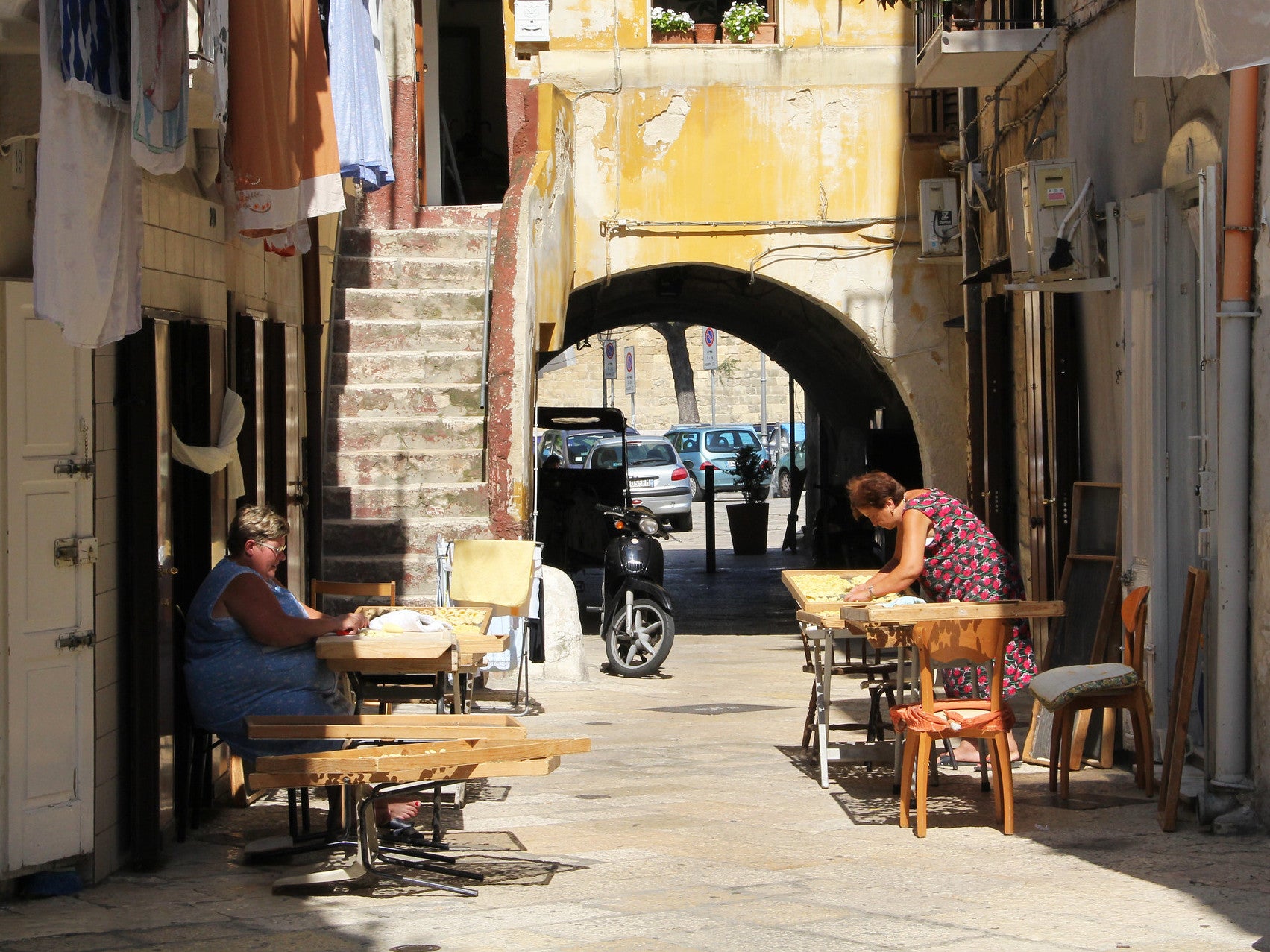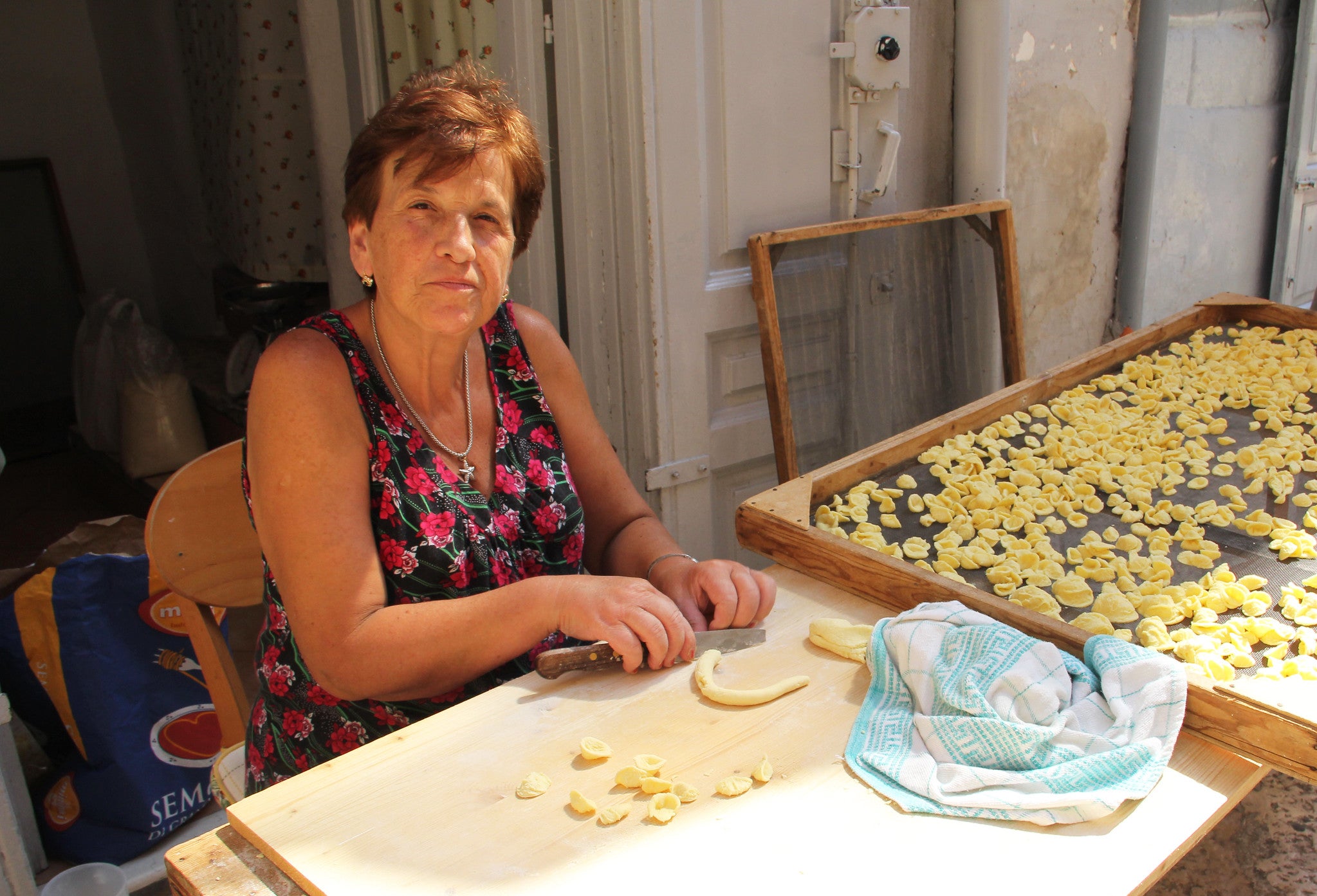Pasta crimes rock Italian town and threaten traditional culinary art
After a restaurant is busted for serving untraceable orecchiette, the pasta makers of Bari fear for their future, finds Jason Horowitz

The grandmothers set up shop early. Out of ground-floor kitchens that opened directly onto the street, they came out singing old songs, sweeping the stone floor and scattering their homemade orecchiette, the city’s renowned ear-shaped pasta, on the mesh screens of wooden trays.
As the pasta dried in the sun along with the sweatpants, T-shirts and bath towels draped from the balconies above, Nunzia Caputo, 61, sat making more with her mother. A local man popped by to buy a kilo, which Ms Caputo weighed out on an old-fashioned scale.
“Here it’s always fresh,” she said, in a kitchen cluttered with simmering pots of sauce, sacks of semola flour and a muted television. “If nobody buys them, we eat all of them. And this happens,” she said, pointing at her belly.
The scene — the grannies, the handmade pasta, the curved stone street — evoked the southern Italy of popular imagination.
The orecchiette makers of the street Arco Basso in the southern coastal town of Bari have drawn cruise ship tourists, and contributed to Lonely Planet naming Bari one of Europe’s top 10 destinations.
They also inspired Dolce & Gabbana to film a cosmetics ad (Pasta, Amore e Emotioneyes) in which Sylvester Stallone’s adult daughters strut down the street in black negligees, dance with the grandmas and sift orecchiette through their fingers.
But local officials suspect that the pasta street, in the historical part of town known as Old Bari, is the scene of a crime that has prompted the orecchiette crackdown scare of 2019.
According to the mayor’s office, in mid-October police inspectors busted a local restaurant for serving untraceable orecchiette, a violation of Italian and European Union regulations that require food in restaurants to be clearly sourced. Police fined the restaurateur and forced him to trash 3 kilograms of pasta.
The November news reports ('Strong hand against the handmade orecchiette in Old Bari' wrote La Repubblica) immediately worried the sharp-elbowed women of Bari, who are permitted to sell small plastic baggies of pasta for personal use, but who are not licensed to deliver large, unlabelled shipments to restaurants.
The women don’t earn much to begin with, and fear having to wear hair-nets, issue receipts and pay taxes. People here are asking if the Italian zeal for regulations, however often ignored, will end up overpowering the local pride in a custom that has brought Bari — where many families have their go-to pasta lady — tourists and much-needed good press.
The mayor, Antonio Decaro, has promised to work something out. In the meantime, he has apparently advised the grannies to lay low.

“Our first citizen told us not to say a word about this,” Ms Caputo said, referring to Mr Decaro. “No information. That it’s bad for us.”
Another nonna, an 82-year-old who spent a recent morning singing old songs (This love had me in chains) and would only be identified as Vittoria, said, “Here everyone is scared that the financial police is going to crack down on us.”
As the grandmother threatened a reporter for asking too many questions, the neighbour across the street blasted AC/DC’s rock anthem “Thunderstruck,” which he called “self-defence” against her constant singing and sharp tongue. “She’s nice if you are passing by for two minutes,” the neighbour said, but added that she was hard to live across from.
On the opposite end of the street, Angela Lastella, 64, stood surrounded by clear plastic bags of orecchiette, taralli crackers and sun-dried tomatoes. She shooed away a carb-hungry pigeon and cooed at local nursery school children on a field trip to the street, but clammed up on the topic of orecchiette trafficking.
Asked about a possible proposal for the women to join together to more legally sell their goods, she shouted with exasperation, “Who’s going to make a co-operative?”
Until 20 years ago, Old Bari was known as “Mugging-town,” a forbidden zone run by criminal clans. Theft has a long tradition here. In 1087, Barese sailors looking for a pilgrimage attraction stole from present-day Turkey the bones of St Nicholas, the model for Santa Claus and now one of Bari’s patron saints. (And the patron saint of, among other things, thieves.) The relics are still in Bari’s San Nicola basilica.
More recently, Vito Leccese, the mayor’s chief of staff, said his boss received a police bodyguard after taking on criminally linked street-food vendors and upset some traditionalists for prohibiting locals from selling raw mussels rinsed in seaport water.
Before pasta, he said, many of the city’s older women sold contraband cigarettes from Montenegro.
“We are trying to help them,” he said, adding that the administration was looking into the possibility of making the area a free-trade zone and that there was nothing wrong with them selling a couple of kilos to the occasional orecchiette user off the books. “It doesn’t hurt anyone,” he said.
The law did not seem of primary concern to many around town. At l’Osteria delle Travi, waiters brought out heaping plates of orecchiette, which Nicola Fiore, a manager, said was not sourced to the women of Arco Basso, but to “another lady,” across town.
Many locals argued that the regulations represented the real threat.
“These women work 10, 15 hours a day, seven days a week to support their unemployed husbands and sons,” said Francesco Amoruso, 76, whose mother, one of the street’s venerable pasta makers, died last year at age 99. “And this is who they come down hard on?”
Michele Fanelli, an advocate for local traditions who also offers classes in orecchiette making, has stepped forward to defend the women, arguing that they are last vestiges of a disappearing Bari. “Globalisation is threatening the traditions,” he warned before walking into Ms Caputo’s kitchen.
He talked orecchiette and globalisation with Ms Caputo and her mother, Franca Fiore, 88. Ms Fiore, when asked about the inspections, shrugged: “They’re right. Taxes and things like that. It’s all off the books.”

As the women pounded, sliced and nimbly moulded the dough, Ms Fiore said her own mother taught her how to make the pasta as a little girl to feed her father and seven brothers. Ms Caputo said her mother’s mother had also “obligated” her to make orecchiette starting at age 6.
(Ms Lastella, the pasta-maker from down the street, had earlier said it was a prerequisite for marriage.)
They meant this in a good way.
“We have to transmit these values to the next generation,” Ms Caputo said. “Everything now is based on technology, all the kids with their technology.”
“Globalisation,” Ms Fanelli concurred.
“They should help us pass this tradition down, not exterminate it,” Ms Caputo continued. “You should teach it at school. You have kids now who can speak two or three languages but can’t do this. If you give them a little ball of dough, their eyes light up.”
“The gospel according to Nunzia,” her son, Rino Caputo, 43, said dismissively as he walked by to stir a pot of peas.
In the evening, as the women brought their trays of pasta into kitchens adorned with St. Nicholas shrines, Diego De Meo, 44, owner of the restaurant Moderat, across from City Hall, waited for the evening rush.
He said he didn’t know which restaurant was caught serving contraband orecchiette but talked about how those little irregular, handmade pasta ears had “a little magic in them.” He suggested that trying to regulate Bari was like trying to straighten the Leaning Tower of Pisa.
“Sometimes the irregular is what makes things beautiful,” Mr De Meo said.
Pressed further for a hint on the identity of the offending restaurant, he paused awkwardly. “It was me,” he blurted out, adding that he alerted other restaurants, many of which he said bought orecchiette from the women.
“Look, it’s correct, it’s the law,” he acknowledged, referring to the fine. But while his business was unaffected, he felt bad for the women of Bari who he said “are perplexed.”
The pasta sting left him bewildered too.
As police rifled through his orecchiette stash and enquired about his dealer, he recalled looking at them with astonishment and asking, “Aren’t you guys from Bari?”
The New York Times
Join our commenting forum
Join thought-provoking conversations, follow other Independent readers and see their replies
Comments
Bookmark popover
Removed from bookmarks